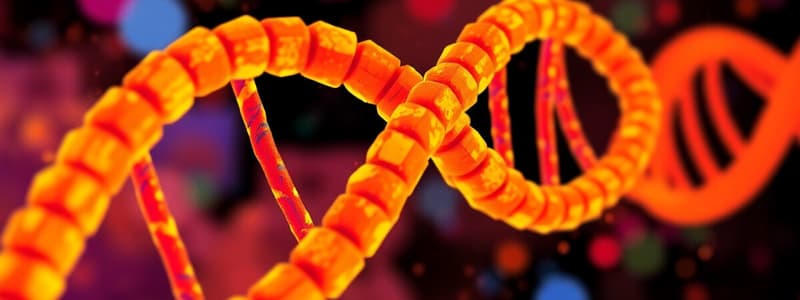Podcast
Questions and Answers
What is the primary role of nucleotides in cellular metabolism?
What is the primary role of nucleotides in cellular metabolism?
- They serve as the building blocks for proteins.
- They act solely as energy carriers.
- They participate in metabolic transactions and chemical signaling. (correct)
- They function as the main components of cell membranes.
Which types of nucleic acids are constituents of nucleotides?
Which types of nucleic acids are constituents of nucleotides?
- Lipids and carbohydrates
- Enzymes and hormones
- Deoxyribonucleic acid (DNA) and ribonucleic acid (RNA) (correct)
- Amino acids and proteins
What is a crucial function of nucleotides beyond being constituents of nucleic acids?
What is a crucial function of nucleotides beyond being constituents of nucleic acids?
- They are essential for cellular energy transfer. (correct)
- They serve as the primary genetic material.
- They act primarily as cell signaling proteins.
- They provide structural support to cells.
How do nucleotides contribute to the storage and transmission of genetic information?
How do nucleotides contribute to the storage and transmission of genetic information?
What kind of role do nucleotides play in response to hormones?
What kind of role do nucleotides play in response to hormones?
What role do nucleic acids play in biological information?
What role do nucleic acids play in biological information?
How is the transmission of biological information characterized?
How is the transmission of biological information characterized?
What is one consequence of the natural damage to biological information?
What is one consequence of the natural damage to biological information?
What can be done to biological information in a laboratory setting?
What can be done to biological information in a laboratory setting?
Which statement correctly describes the structure of chromosomes?
Which statement correctly describes the structure of chromosomes?
Study Notes
Nucleotides and Nucleic Acids Overview
- Nucleotides serve multiple roles in cellular metabolism, acting as energy currency, chemical links in cellular responses, and components of enzyme cofactors and metabolic intermediates.
- Major types of nucleic acids include deoxyribonucleic acid (DNA) and ribonucleic acid (RNA), which are essential for genetic information storage and transmission.
Importance of Nucleic Acids
- Nucleic acids encode the structure of proteins and other biomolecules, determining cellular functions and components.
- The ability to store and transmit genetic information is crucial for life, ensuring continuity across generations.
Five Principles of Biological Information
- Principle 1: Nucleic acids function as repositories of biological information, which is essential for life forms; RNA can also act as a functional expression by directing protein synthesis or serving as catalysts.
- Principle 2: Molecular complementarity allows the transmission of biological information; chromosomes are large polymers of nucleotides, with information encoded in their sequences, ensuring structural uniformity.
- Principle 3: Biological information is vulnerable to damage, leading to mutations, which are vital for the evolutionary process.
- Principle 4: Laboratory techniques enable the access, interpretation, and modification of embedded biological information in nucleic acids.
Nucleoside Triphosphates
- Nucleoside triphosphates, particularly adenosine triphosphate (ATP), are central to cellular metabolism, serving as energy carriers and regulatory signals.
- ATP represents the culmination of catabolic pathways and fuels anabolic processes, establishing it as a key player in metabolism.
Advancements in Nucleic Acid Techniques
- Techniques for sequencing, synthesizing, and manipulating nucleic acids are rapidly evolving, emphasizing their significance in biochemistry and molecular biology.
- The ongoing development of these methods enhances the understanding and application of nucleic acids in various scientific domains.
Studying That Suits You
Use AI to generate personalized quizzes and flashcards to suit your learning preferences.
Description
Explore the fundamental concepts of nucleotides and nucleic acids in this quiz based on Chapter 8. Discover the basic definitions, structures, and chemical properties of nucleic acids, along with their diverse functions in metabolism. Perfect for students looking to solidify their understanding of these crucial biomolecules.



